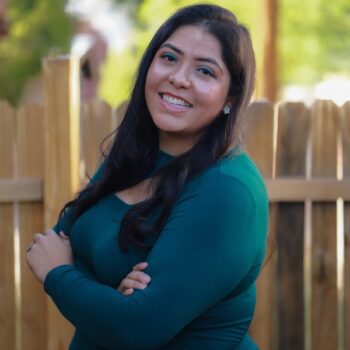We teamed up with Convergence Magazine to ask grassroots organizers from across the country what they learned during the 2022 elections. Here’s what Grecia Lima from Community Change/Action learned.
Community Change/Action is a national organization that works with hundreds of grassroots organizations across the country. This midterm cycle, Community Change/Action organized voters in Arizona, Georgia, Michigan, New Mexico, Nevada, and Wisconsin.
What’s an organizing success that you had during the midterms that gives you hope?
We had so many wins this cycle and every single one of them is credited to organizing — not just over these past few months but year-over-year. But the one that really stands out this year is our partner OLÉ’s win on constitutional amendment 1 in New Mexico — the first constitutional amendment to dedicate funding for early childhood education and spend $150 million a year on early learning. This one gives me hope for two reasons. For one, it was the product of over a decade of organizing. It proves that staying in the fight for the long game is worth it. Some of the families that started this fight have kids who are now in high school, so they won’t benefit themselves, but they stayed dedicated to the work to make New Mexico a better place for everyone’s children. They overcame many political obstacles, primarying legislators who stood in their way. Ultimately, they got 70% bipartisan voter support for this initiative.
The second reason this win gives me hope is that it could be a model for the rest of the nation. Not every state has access to the same revenue streams as OLÉ, but they can learn from OLÉ’s organizing. Earlier in the year, childcare providers from a dozen other states came to Albuquerque to help knock on doors to win this initiative. The national child care movement is stronger than ever.
What was the most effective message or tactic that the other side used? How did you try to combat it? Were you successful?
The GOP’s tactic is to feed off of anxiety and instability. Earlier this year, Community Change launched a deep, nationwide research project that found, across differences in ideology, voters were open to a new economic framework that would bring them security and stability. They wanted a new way forward that made them feel safe. They shared values of care, community and family, and racial justice. And nearly 70 percent were open to joining together to effect positive change, regardless of their differences.
We talked to voters on the ground about the ideas progressives have that will make them breathe easier – and that was very successful. Some of the successes we saw as a result include the childcare funding victory in New Mexico,, a rent stabilization ballot initiative in Florida, and healthcare access in South Dakota. Deep listening in communities about the anxieties voters have — and responding to those concerns with tangible economic ideas — ultimately beat out right-wing extremism, racism, and xenophobia.
It’s also really important to consider who is delivering that message. Our partners Michigan Liberation, Stand Up for Ohio, and Black Male Initiative Fund in Georgia, for example, have returning citizens reach out to those in their community who have been impacted by the criminal system and talk about how civic engagement can lead to real changes to that system. On TikTok, we have makeup influencers, music artists, and other niche communities reaching out to their own networks of followers. While it’s hard to measure exact impact here (that’s something we’re working on), the influencers we work with have an average 15-25% engagement rate For in-person engagement, we also held drag shows and taco nights to build community. And that engagement goes beyond one night or one digital action, as folks who show up get engaged with our relational organizing pipeline.
Relational organizing – that friend-to-friend, family-to-family, neighbor-to-neighbor outreach – is really important to defeating the disinformation and fear mongering of the other side. It’s also one of the most effective methods to turnout voters. This year, we reached hundreds of thousands of voters through relational organizing. Just one of the families in Stand Up for Ohio’s relational voter turnout program recruited over 1,000 volunteers who reached out to 20,000 close friends and family.
What did you think was going to work that didn’t work?
We definitely expected to have more money and resources to work with this cycle.
Lacking funds means making hard choices with our partners, like waiting until later in the cycle to have direct candidate conversations – which makes the critical persuasion and name ID pieces of the campaign really difficult. Without a head start on having candidate conversations, we allow the other side to frame the narrative and put ourselves in a place of defense, rather than offense on our values and candidates.
We need funders to see beyond a single cycle or legislative campaign or promising moment. We need funders to invest in the Black, Latino, and immigrant leaders and organizations who make those moments possible at their very core. We need funders to give when and where no one is looking, when it’s not financially expedient, when financial markets aren’t at record highs. Those are the times when grassroots groups are hurting — especially the ones led by immigrants and Black people, Latinos, and other people of color.
This is about more than the political horse race. The deep work of relationship building, of organizing, of creating a political home — this work builds resilience to withstand losses as well as the power to win the next cycle or the one after that.
Read more in our View from the Grassroots series:
- Brendan Walsh, Worker Power (Arizona)
- Elianne Farhat, TakeAction MN (Minnesota)
- Daniel Altschuler, Maegan Llerena, and Leo Murrieta, Make the Road Action (New York, Pennsylvania, Nevada)
- Tascha van Auken & Divya Sundaram, NY Working Families Party (New York)
- Carrie Santoro, PA Stands Up (Pennsylvania)
- Sam Smith, PA United (Pennsylvania)
- Jay Malone, Texas Gulf Coast Area Labor Federation (Texas)
- Katey Lauer, West Virginia Can’t Wait (West Virginia)
- Christine Neumann-Ortiz, Voces de la Frontera Action (Wisconsin)
- Celina Culver, SURJ

